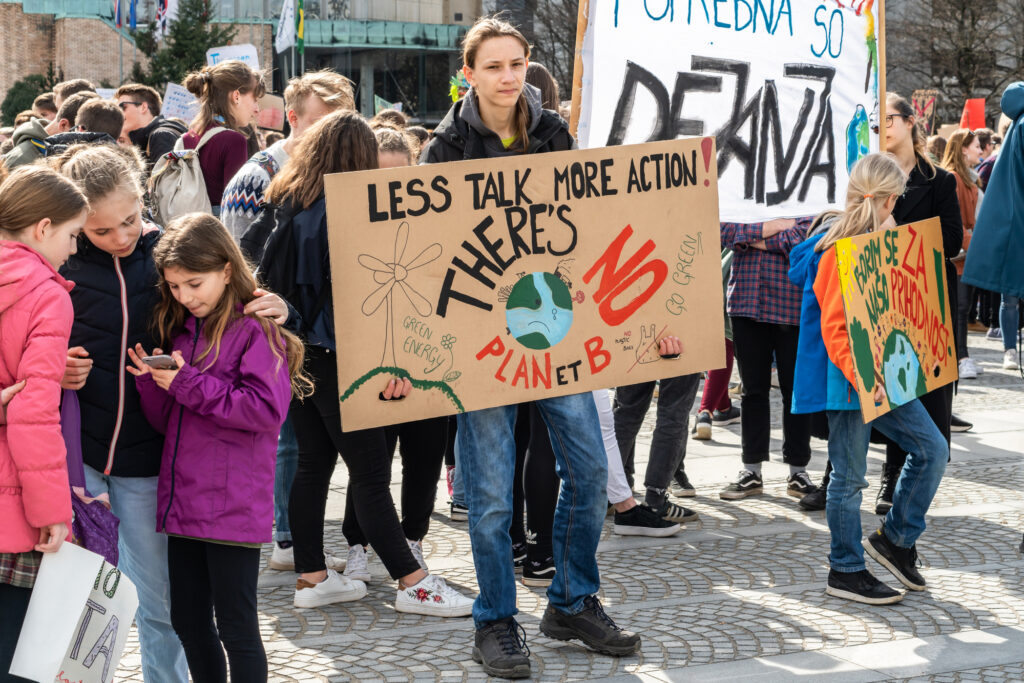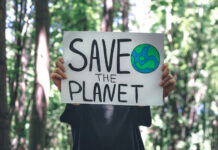In a newly released paper, Elizabeth Marks, Caroline Hickman, and colleagues explore young people’s attitudes about climate change. The current research surveyed 10,000 people from 10 different countries and is presently the most extensive and most diverse research conducted into attitudes around climate change.
According to the authors, most young people feel negative emotions about climate change, and nearly half say these feelings affect their everyday lives. The respondents also report distrust in their governments as a result of inaction on this issue.
“A large proportion of children and young people around the world report significant emotional distress and a wide range of painful, complex emotions (sad, afraid, angry, powerless, helpless, guilty, ashamed, despair, hurt, grief, depressed)” the authors write.
“Similarly, large numbers report experiencing some functional impact and identify pessimistic beliefs about the future (people have failed to care for the planet; the future is frightening; humanity is doomed; they won’t have access to the same opportunities their parents had; things they value will be destroyed; security is threatened, and they are hesitant to have children).”

Previous research has shown climate change to have a significant effect on the mental health of our youth. In a survey given to 11,000 members of Gen Z, climate change and pollution were the two most cited global concerns.
Research has also found that the adverse effects of climate change affect people far removed from the cites of climate disasters and can persist for years. Authors have compared the kind of stress associated with climate change, namely that something terrible can happen randomly, suddenly, and insidiously, to the stress associated with living under a military dictatorship, living in homes with domestic violence, living with the risk of cancer relapse, and living close to a nuclear reactor.
Research has shown that climate change-related weather events positively correlate with poor physical health, depression, PTSD, increased psychiatric hospital visits, and suicide. For example, using historical temperature records, one piece of research estimates that by 2050, Mexico and the United States will see between 9,000 and 40,000 additional suicides due to increasing temperatures. By this measure, climate change would have roughly the same impact on suicides as an economic recession.
While the stress associated with climate change can have disastrous effects on our mental and physical health, that stress may also be the key to taking action on this topic. According to one author, individuals with the highest rate of ecological stress are the most likely to engage in pro-environmental behaviors.
Other research has blamed individual “psychological barriers” for our collective inaction on climate change. However, some authors believe this to be an insidious narrative designed to allow powerful corporations to continue their destructive practices by blaming climate change on individuals (that refuse to take action) rather than corporations (that take destructive actions on a much larger scale).
The present research examines survey data from 10,000 participants aged 16-25 years. The researchers selected ten countries from which to pull participants to reflect attitudes from both the global north (United Kingdom, Finland, France, United States, Australia, and Portugal) and the global south (Brazil, India, Philippines, and Nigeria).
The survey examined seven dimensions related to climate change attitudes: climate-related worry, climate-related functional impact, climate-related emotions, climate-related thoughts, the experience of being ignored or dismissed, beliefs about the government response to climate change, and emotional effects of government response to climate change.
60% of respondents reported feeling “very” or “extremely” worried about climate change. In addition, over 45% said feelings about climate change negatively affected their daily lives.
77% said the future was frightening due to the impacts of climate change. Again, poorer countries, and those located in the global south, were more likely to report negative emotions. The exception to this finding was Portugal, which showed the highest level of worry. The authors attribute this to an increase in wildfires in the country since 2017.
The least reported emotions around climate change were optimism and indifference. Among the participants who attempted to speak with others about climate change (81.2%), 48.4% reported being ignored or dismissed.
The attitudes towards government response to climate change were also overwhelmingly negative. For example, 60% of respondents agreed with every negative statement and disagreed with every positive statement the survey presented about government action on climate change.
The current research has found that a large portion of young people experiences significant emotional distress around climate change. Furthermore, the more negative this group views the government’s response to climate change, the more emotional distress they experience.
Negative emotions around climate change are present both in countries with significant physical impacts from climate disasters and in countries with less obvious consequences.
According to the authors, some common ways adults and governments respond to climate change primarily involve dismissing, ignoring, disavowing, rationalizing, and negating the negative experiences of others. As a result, the anxiety young people feel around ecological disasters is compounded by the impression that influential people do not care about the problem.
The authors reject the popular narrative of blaming climate change on irresponsible individual behaviors and instead say it is precisely these powerful entities that must act to combat climate change. To remedy climate change’s negative mental health impacts, the authors propose increased psychosocial resources, coping skills, and agency. They write:
“Factors known to protect against mental health problems include psychosocial resources, coping skills, and ‘agency’ to address and mitigate stressors. In the context of climate anxiety, this would relate to having one’s feelings and views heard, validated, respected, and acted upon, particularly by those in positions of power and upon whom we are dependent, accompanied by collective pro-environmental actions.”
The authors recognize several limitations to this study. A non-standardized measure was used to conduct the survey. Second, the term “climate anxiety” is not well defined and has varying definitions across the literature. Third, the use of online surveys limited responses to people that had access to the internet.
****
Hickman, C. et al. (2021). Young people’s voices on climate anxiety, government betrayal, and moral injury: a global phenomenon. The Lancet. Preprint. (Link)















“some authors believe this to be an insidious narrative designed to allow powerful corporations to continue their destructive practices by blaming climate change on individuals (that refuse to take action) rather than corporations (that take destructive actions on a much larger scale).”
I’m pretty certain this is the problem, and the ecological harm being done to our planet – by the pharmaceutical industry, for example – is a much bigger problem than their nebulous “climate change is caused by individual’s” propaganda, which is frightening our children.
It’s very similar to the pharmaceutical industries’ – and their bought out and paid for psychiatrists’ and psychologists’ debunked belief – that all distress is a caused by a “chemical imbalance” in individuals’ brains propaganda.
It’s a shame my “holistic Christian talk therapist” psychologist, who it turned out – according to her eventual confession, medical records, and my family’s medical records – got all her misinformation about me from pedophiles and child abusers. Thus, she had delusions that distress caused by 9.11.2001 – the morning my innocent child was denied a baptism, three times, by an unethical Russian American ELCA pastor – was distress caused by a “chemical imbalance” in my brain alone. WTF?
Although I do believe the pharmaceutical industry’s staggering amount of false advertising and propaganda is criminal. Since I was taught decades ago, as a young marketing major, that false advertising is illegal.
And I, for one, know how criminal the pharmaceutical – and too many within the medical – industries are. Since I know all doctors are taught in med school that drugs, that the pharmaceutical industry fraudulently calls “antidepressants” and “antipsychotics” – the anticholinergic drugs – can create “psychosis,” via anticholinergic toxidrome.
https://en.wikipedia.org/wiki/Toxidrome
So, yes, the real problem is systemic corporate and industry crimes – not a lack of action on the part of the innocent moms – who actively stand up and speak out against the systemic child abuse covering up crimes of the psychological, psychiatric, and religious industries.
https://www.indybay.org/newsitems/2019/01/23/18820633.php?fbclid=IwAR2-cgZPcEvbz7yFqMuUwneIuaqGleGiOzackY4N2sPeVXolwmEga5iKxdo
https://www.madinamerica.com/2016/04/heal-for-life/
https://books.google.com/books?id=xI01AlxH1uAC&printsec=frontcover&source=gbs_ge_summary_r&cad=0#v=onepage&q&f=false
But our children do need to chill out, and do some actual research into the systemic crimes of some of our big industries. Instead of trying to blame their parents for not being freaked out by big business’, government’s, and mainstream media’s propaganda about “climate change.”
Since, instead, we have bigger concerns about these systemic big industries’ crimes, by big industries’ like big Pharma. But these systemic big business crimes include the crimes, and the unconstitutional nature, of our Federal Reserve banking system, too.
A little insight into what those, who have been discussing these real societal problems – who’ve been censored from the mainstream internet – are discussing.
https://www.sgtreport.com
https://www.americasfrontlinedoctors.org
Oops! The decent doctors are being censored! We all need to wake up – and listen to the ethical doctors – who are being censored, from the mainstream media outlets, by big tech, likely for big Pharma.
Oh, but distress in all our naive children – who’ve bought into our mainstream media’s fear mongering propaganda about “climate change” – will now need to be “diagnosed” as “distress caused by a chemical imbalance in their brains'” alone? By the globalist pharmaceutical industry’s bought out, misinformed, scientifically “invalid,” “blame the patient,” DSM “bible” billing “mental health” workers?
http://psychrights.org/2013/130429NIMHTransformingDiagnosis.htm
I pray God judges all fairly instead, but who knows? So the decent and well researched people do need to keep speaking out against big industries’ crimes. Internet censorship should NOT be happening in America, including to well researched and honest doctors, but it is … big time.
But this is a non-censured, left wing comedian’s take of the societal insanity that we’re all dealing with today, which will hopefully make you all laugh. And it is healthy to laugh, and have no fear. In Benjamin Franklin’s words:
“Those who would give up essential liberty to purchase a little temporary safety, deserve neither liberty nor safety.”
https://www.youtube.com/watch?v=NUIXtfsQLCI
And God bless to all on this site, in your healing journeys.
Report comment
Yeah, the government(and media, and businesses) kept lying about climate change, and that gave me anxiety, so I stopped trusting them.
I’m not eating soylent green just to protect the international hoarder class from the consequences of THEIR actions. They have the power to fix it, they can use it or burn with the rest of us.
Report comment
I hope it is obvious to all what is missing in this study: That we are talking here about perceptions about the future leading to anxiety (instead of effective action).
Both the Climate Change issue and various related ones, like pollution, are being driven by propaganda campaigns, not lived experience. And this study measures the effects of those campaigns, not that experience.
What is most troubling to me is that the people creating these campaigns, being professionals in what they do, probably intended the results that were measured: Anxiety instead of effective action.
At this point, I think the most effective action would be to shut off the campaigns! They aren’t achieving a better life on Earth and are degrading our mental health. Obviously, a different approach is needed, if we really care about these issues for what they are, and not only for how effectively they can be used to scare people.
Report comment